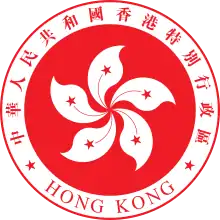Foreign relations of Hong Kong
Under the Basic Law, the Hong Kong Special Administrative Region is exclusively in charge of its internal affairs and external relations, whilst the Government of the People's Republic of China is responsible for its foreign affairs and defence.[1] As a separate customs territory, Hong Kong maintains and develops relations with foreign states and regions, and plays an active role in such international organisations as World Trade Organization (WTO) and the Asia-Pacific Economic Cooperation (APEC) in its own right under the name of Hong Kong, China.[2] Hong Kong participates in 16 projects of United Nations Sustainable Development Goals.[3]
 |
|
Politics and government of Hong Kong |
|
Related topics |
Overview

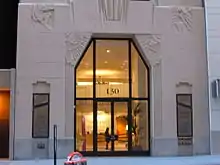
.JPG.webp)
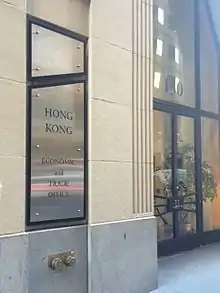
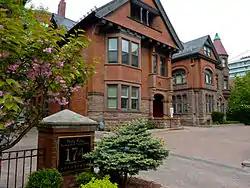
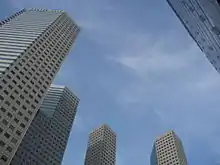
Hong Kong was under British rule before 1 July 1997. Prior to the implementation of the Hong Kong Economic and Trade Office Act 1996 enacted by the British Parliament, Hong Kong represented its interests abroad through the Hong Kong Economic and Trade Offices (HKETOs) and via a special office in the British Embassies or High Commissions, but the latter ceased after the sovereignty of Hong Kong was transferred to the PRC and became a special administrative region (SAR) of the PRC in 1997.[4] At present, the Hong Kong Economic and Trade Offices under the Government of the Hong Kong Special Administrative Region in countries that are the major trading partners of Hong Kong, including Japan, Canada, Australia, Singapore, Indonesia, the United Kingdom, Germany, the United States, the European Union as well as an ETO in Geneva to represent HKSAR Government in the WTO. These offices serve as the official representative of the Government of the Hong Kong SAR in these countries and international organisations. Its major functions include facilitating trade negotiations and handling trade related matters, inter-government relations with foreign governments; the promoting of investment in Hong Kong; and liaising with the media and business community. The Hong Kong Government has also set up the Hong Kong Tourism Board with offices in other countries and regions to promote tourism.[5]
The Hong Kong SAR Government also has an office in Beijing, and three HKETOs at Guangzhou (Guangdong ETO), Shanghai and Chengdu. An HKETO will be set up at Wuhan in the future. The Central People's Government of the PRC also maintains a liaison office in Hong Kong. The Ministry of Foreign Affairs has a representative office in Hong Kong.

██ Berlin office and covered countries
██ Brussels office and covered countries
██ Jakarta office and covered countries
██ London office and covered countries
██ Singapore office and covered countries
██ Sydney office and covered countries
| country / region | location/Official website | Jurisdiction/address |
|---|---|---|
| Sydney | ||
| Brussels | ||
| London | ||
| Barcelona | [Carrer de Tuset, 5,6th Floor – 08006 Barcelona,Spain] | |
| Moscow | [Aviareps AG 7th Floor, Business Centre “Diamond Hall”14 Olympiysky prospect Moscow, 129090 Russia] | |
| Paris | [32 rue de Caumartin - 5eme etage 75009 Paris France] | |
| Praha | [Na Kocínce 3160 00 Praha 6 Czech Republic] | |
| Milan | [Via Orefici, 2, 20123 Milan,Italy] | |
| [Budapest] | ||
| Stockholm | [Upplandsgatan 14,111 23 Stockholm Sweden] | |
| Warsaw | [Al. Solidarnosci 113 lok. 2800-140 Warsaw, Poland] | |
| Sao paulo | [Rua Cel. Xavier de Toledo,316 - Cj 10A - lo.andarCEP 01048-000 Sao Paulo-SPBrazil] | |
| Santiago | [Fidel Oteiza 1916 Of 701Providencia, Santiago Chile] | |
| Berlin | ||
| Kuala Lumpur | [AVIAREPS Malaysia Suite 2701, Level 27 Wisma Chuang,34, Jalan Sultan Ismail, 50250,Kuala Lumpur, Malaysia] | |
| Tokyo | ||
| Seoul | [Suite 1105, President Hotel 16 Eulchiro Jung-gu, Seoul South Korea] | |
| Makati City | [Supersonic Services Inc Ground Floor, Colonnade Residences Condominium 132 C. Palanca Jr St.Legaspi Village, Makati City, 1220 Philippines] | |
| Singapore | ||
) |
Jakarta | |
| Bangkok(Webpage building) | ||
| Geneva | World Trade Organization | |
| New York | ||
| San Francisco | ||
| United States | ||
| Toronto | ||
| [Vancouver] | ||
| New Delhi | [Mileage Communications (India) Pvt. Ltd. 261 (First Floor) Lane 5 Westend Marg, Said-Ul-Ajaib New Delhi 110030 INDIA] | |
| Dubai | [Gulf Reps Ltd PO Box 75142 Mezzanine Floor,The Travel Center,Shk. Zayed Road, Dubai UAE] | |
| Ho Chi Minh | [Suite 701-702, Saigon Tower Office Building29 Le Duan Street, Dist. 1Ho Chi Minh City, Vietnam] | |
| Beijing | 北京市、天津市、河北省、遼寧省、吉林省、黑龍江省、內蒙古自治區、新疆維吾爾自治區、甘肅省、寧夏回族自治區 | |
| Shenyang | ||
| Guangzhou | 福建省、廣東省、廣西壯族自治區、海南省、雲南省 | |
| Fuzhou | ||
| Shenzhen | ||
| Shanghai | 上海市、江蘇省、浙江省、安徽省、山東省 | |
| Jinan | ||
| Chengdu | 四川省、重慶市、貴州省、陝西省、青海省、西藏自治區 | |
| Chongqing | ||
| Wuhan | 湖北省、湖南省、山西省、江西省、河南省 | |
| Changsha | ||
| Zhengzhou | ||
| Taipei | ||
| Nairobi | 3rd Floor, Sanlam House,Kenyatta Avenue,Nairobi,Kenya | |
| Johannesburg | Wanderers Office Park,52 Corlett Drive Illovo 2196 Johannesburg South Africa | |
Hong Kong makes strenuous law enforcement efforts, but faces serious challenges in controlling transit of heroin and methamphetamine to regional and world markets; modern banking systems that provide a conduit for money laundering; rising indigenous use of synthetic drugs, especially among young people.
Hong Kong has its own immigration policy and administration. Permanent residents of Hong Kong with PRC nationality hold a different type of passport, called the Hong Kong Special Administrative Region Passport, which is different from that for PRC citizens in Mainland China.[6] Hong Kong permanent residents and mainland Chinese need a passport-like document (the "Home Return Permit" for Hong Kong permanent residents and the Two-way Permit for Mainland Chinese) to cross the Sino-Hong Kong border. Visitors from other countries and regions not participating in waiver programme are required to apply for visas directly to the Hong Kong Immigration Department.
International agreements
In accordance with Article 151 of the Basic Law, Hong Kong concluded over 20 agreements with foreign states in 2010 on matters such as economic and financial co-operation, maritime technical co-operation, postal co-operation and co-operation on wine-related businesses. With the authorisation of the Central People's Government of the PRC, Hong Kong also concluded 12 bilateral agreements with foreign states on air services, investment promotion and protection, mutual legal assistance and visa abolition during the year.
Free trade agreement
Officially signed
- Mainland China(CEPA)(June 2003)
- New Zealand(March 2010)
- Chile(September 2012)
- Iceland, Liechtenstein, Switzerland(October 2012)
- Norway(November 2012)
- Macao(October 2017)
- Georgia(June 2018)
- Australia(March 2019)
- ASEAN(June 2019)
- Maldives(Negotiations completed)
Negotiating
International organisation participation
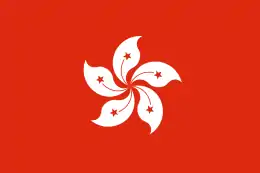
Note
- Membership in 41 intergovernmental international organizations or their affiliated institutions
- Participate in 37 intergovernmental international organizations or their affiliated institutions as observers
|
|
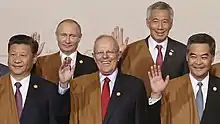

Overseas visits made by senior officials
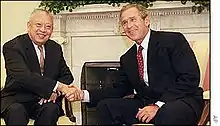
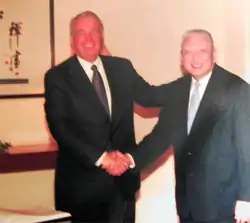
The Chief Executive of Hong Kong & other senior officials often make a duty visit to foreign countries. These visits usually aim to advance Hong Kong's economic and trade relations with the foreign countries. During these visits, the Chief Executive will meet with political and business leaders. Usually, the head of state or head of government of the foreign countries will receive the Chief Executive. For example, former Chief Executive Tung Chee-hwa made three visits to the United States during his term. In these three visits, Tung Chee-hwa met with the U.S. President in the Oval Office at the White House. Chief Executive Donald Tsang had visited Japan, South Korea, Russia, United Kingdom, United States, Australia, New Zealand, Chile, Brazil, India, France and other countries during his term of government.
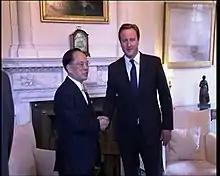
For example, the then Chief Executive Donald Tsang visited London and Edinburgh in 2011 as part of his European tour to renew ties with the UK and promote Hong Kong as a gateway to Asia. He met Prime Minister David Cameron and Foreign Secretary William Hague, and the Chancellor of the Exchequer George Osborne.[7] In mid-2011, Donald Tsang visited Australia in June to strengthen ties between Hong Kong and Australia, promote trade opportunities, and encourage more Australian companies, particularly resources companies, to list in Hong Kong. During his visit, Mr Tsang held meetings with the Prime Minister, Julia Gillard, and the Minister for Foreign Affairs, Kevin Rudd, as well as the leader of the Opposition, Tony Abbott, and the Shadow Minister for Foreign Affairs, Julie Bishop.
Many foreign dignitaries visit Hong Kong each year.[8] The number of such visits has grown since 1997 as many of them have included Hong Kong as a destination on their trips to China, while others have visited Hong Kong specifically to see "one country, two systems" in operation. The level of VIP visits is also boosted by major international conferences held in Hong Kong in recent years. In 2009–2012, there were 11 official visits to Hong Kong, including the visits of the Prime Minister of Canada, Secretary of State of the United States of America, President of the Russian Federation, President of the Republic of Indonesia, President of the Republic of Korea and other foreign dignitaries.
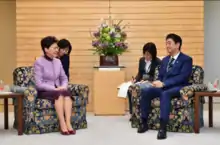
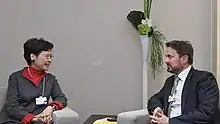
In 2018-2019,Hong Kong Chief Executive Carrie Lam met withPrime Minister of JapanShinzō Abe,Prime Minister of SingaporeLee Hsien Loong,Prime Minister of ThailandPrayut,President of IndonesiaJoko,State Counsellor of MyanmarAung San Suu Kyi,President of Panama,Minister of Finance of MalaysiaGuanying Lin,Prime Minister of FrancePhilip Act,Vice-President of the European CommissionMogherini,Russian Foreign MinisterSergey Lavrov.
Overseas representation in Hong Kong
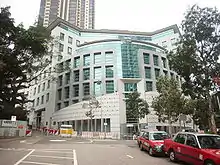
The British Consulate General in Hong Kong
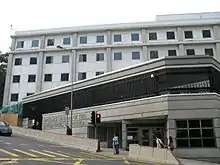
U.S. Consulate General in Hong Kong
When Hong Kong was under British rule, most Commonwealth member states, unlike other countries, were represented in Hong Kong by Commissions. However, following the 1997 handover, they were all renamed Consulates-General. Owing to Hong Kong's economic importance, and the large number of British passport holders, the British Consulate-General is the largest of its kind in the world and bigger than many British Embassies and High Commissions abroad.[9]
Most countries maintain Consulates-General or Consulates in Hong Kong. However, despite their name, many Consulates-General are not subordinate to their country's embassy to the PRC in Beijing. For example, the British Consulate-General is directly subordinate to the Foreign and Commonwealth Office of the UK rather than the British embassy in the Chinese capital.[10] The Consul-General of the United States, likewise, holds ambassadorial rank, and reports to the Assistant Secretary of State for East Asian Affairs in the US Department of State.[11] By contrast, the US Consuls-General posted to Chengdu, Guangzhou, Shanghai, and Shenyang report to the Deputy Chief of Mission of the US Embassy in Beijing who is directly subordinate to the US ambassador.
See also
- Foreign relations of the People's Republic of China
- Foreign relations of Macau
- Consular missions in Hong Kong
- Hong Kong-United Kingdom relations
- Hong Kong – United States relations
- Hong Kong–Taiwan relations
- Visa policy of Hong Kong
References
Citations
- Article 151, Hong Kong Basic Law
- Article 152, Hong Kong Basic Law
- "Search - United Nations Partnerships for SDGs platform". sustainabledevelopment.un.org.
- Hong Kong Economic and Trade Office Act 1996
- Article 156, Hong Kong Basic Law
- Article 154, Hong Kong Basic Law
- "news.gov.hk - Photo Gallery - People". www.news.gov.hk.
- "Protocol Division Government Secretariat - VIP Visits". www.protocol.gov.hk. Archived from the original on 2 February 2014. Retrieved 25 January 2014.
- "British Consulate General Hong Kong - GOV.UK". www.gov.uk.
- Commons, The Committee Office, House of. "House of Commons - The UK's relations with Hong Kong: 30 years after the Joint Declaration - Foreign Affairs". publications.parliament.uk.
- Christopher J. Marut Appointed as Director of the Taipei Office of the American Institute in Taiwan, American Institute in Taiwan, May 8, 2012
